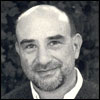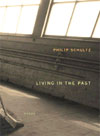Welcome to The Writer's Almanac Bookshelf, where you'll find highlighted interviews of poets heard on the show.
Philip Schultz

I've always been fascinated with the material of this book. In fact, I've been writing pieces of it since I began writing. My first stories and poems often dealt with the characters in my childhood house, my uncle and grandma, my parents. I knew I was going to be a writer when I was fifteen or sixteen and somehow seeing larger-than-life people as characters helped me deal with the drama happening around me.
I imagine art provided me with the distance and perspective necessary to survive and begin to understand an otherwise overwhelming world. My father was born in Russia, my grandma in Lithuania, most of our neighbors were immigrants (who hated one another) and then the displaced people from the war in Europe came to overwhelm everyone else so no one would feel left out.
I wrote stories, poems and plays about this material. I was in many ways living in the past. And I kept failing to do justice to this material, until I tried it in the one form that came most naturally to me, poetry. I began it just after completing my first book of poetry in 15 years, The Holy Worm of Praise (Harcourt 2002). It came quickly. The entire process took less than a year. It was joyous. Finally, when I was 57, I was living in the present firmly enough to write about the past.
I write mostly in my study, in my house in East Hampton. That's where I'm most comfortable, with my family still sleeping and my dog Penelope curled under the drab olive sofa.
Q: How do your roles as teacher and writer interact?
Mightily. I love to teach, I realized that early on. Grandma would say, with kind affection, that I love to hear the sound of my own voice. Which no doubt is true. Teachers like to hear what they have to say or they wouldn't spend so much time saying it. But that's true of writers and actors and no doubt train conductors, who love to hear themselves singing the names of towns. Teaching is an essential part of my writing. At times I hear myself explaining something I didn't know I knew, which usually means I'm working out something important.
Teaching is a kind of thinking and since I enjoy entertaining people I sometimes use humor and pathos (maybe too much pathos) to make my point. In fact, my method of teaching is based on my method of writing. I take the story or characters or emotional situation as deeply as I can in trying to discover the truth of what I'm really feeling under all the collected junk. Like so many writers, I first take the course of least resistance and then proceed from there. For most of these reasons I started a graduate writing program at NYU back in the early 80's and then my school, The Writers Studio, in 1987. Now I teach teachers how to teach. Helping others is very satisfying and teaching can be a pure, profoundly selfish form of giving.
Which is to say the writing flows out of all this process in some mysterious, stubborn, often perverse way.
Q: Was there a teacher sometime in your life who inspired you to write or influenced your writing style?
Many. I was a terrible student. I had dyslexia (though no one knew what that was back in the 50's) and didn't learn how to read until I was in the fifth grade. I was in the dummy class where everyone, including me, believed I belonged. But I remember Miss Crittenden, my fourth grade teacher, who worked so hard to help me build a little self-confidence. She was blond, short and maybe a little squat, and owned a smile that, as far as I was concerned, became famous throughout the Finger Lakes. This was the inner city of Rochester, NY, a tough school in a tougher neighborhood, and she was forever searching for lost souls she refused to give up on. I'd tag along on many of these searches and, well, I fell in love with her courage and staunch belief in helping even or perhaps especially those who couldn't seem to help themselves. I will never forget her, though I'm sure I never spoke more than ten words to her. I was too smitten.
Another teacher was the poet George Oppen. I had dinner at his house nearly ever Friday evening for well over a year. He showed me how he looked at what he was working on just before going to bed and first thing in the morning because he often worked through problems in his sleep. Identity may play an important role with mentoring, but it most likely also involves the instinct to include and further yourself through the young, who represent the future.
Q: Would you tell us about your current project, Failure, especially describing its subject and title?
While I was working on Living in the Past I realized that there was a larger story about the boy's father that I wanted to deal with at a later point. That story was about failure, a subject I've been dealing with without knowing it all my writing life. It wasn't until I was 57 and had finished Living in the Past that I was ready to deal with it head-on.
A year ago, during lunch with a friend, I found myself talking at length about my father's death and bankruptcy when I was eighteen. My mother and I were left penniless. I've written about my father in many poems and stories but never before at a level of understanding, and perhaps forgiveness, that I've been able to now. Perhaps it's because I'm a father to two boys (six and ten years old) and now have some idea of what my father must have been going through when he was losing everything except perhaps what was most valuable, my mother and myself. Also, I turned Sixty one year ago, my father's age when he died. Time plays such a strong, mysterious role in these things.
I went home after lunch and wrote a poem called "The One Truth" and then another called "Failure." Everything flowed out of these two poems, especially the long poem at the end of the book about a dog walker. I had thought it was about dogs and 9/11 but realized it was really about failure, although not only my father's and mine. It was about how nearly impossible it is to be a human being in our time.
I find people react strongly to the title. Friends have pleaded with me to use and not use it. One friend referred to it as the great American taboo. Although tragedy can come from it, failure is not the same thing; tragedy suggests finality, an end to grief or loss, while failure is more like a long illness that never quite ends. I think it's impossible to be obsessed with success without being equally obsessed with failure. Or the fear of it. Perhaps every writer has only one true subject. In any case, I now know what mine is.
Philip Schultz lives and writes in East Hampton, New York with his wife, two sons and his dog Penelope. He has received awards for his writing from the American Academy of Arts and Letters and the Academy of American Poets. Schultz is the author of several collections of poetry including Living in the Past, and his next collection, Failure, will be published by Harcourt in the fall of 2007.
